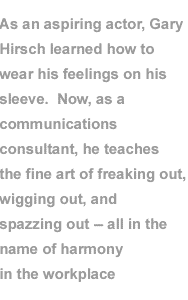 |
|
||||||||||||

|

|
|
By Renee Bacher |
When Gary Hirsch arrives at the Bonneville Power Administration, a Federal utility agency in Portland, Oregon, he takes a quick tour of the facility, then heads to a conference room and moves out all the furniture, leaving behind a few chairs and an overhead projector. He's about to lead some 30 Bonneville employees through his seminar, "On Your Feet, Improvisation for Business." By the time he's through, the zombies and workaholics among them will be -- if not completely reformed -- sprightlier workaholics and zombies. The participants begin to arrive. Most attend only because they have to, and, as a bunch, they don't exactly glow with the fire of life. "Everyone is stressed out," Hirsch says to me confidentially. "They're going to have to be stand-up comics for the next few hours." Then he launches into his performance, beginning with a micro-spiel about who he is and what he does (artist, actor, dad; teaches principles of improvisation to business people), but keeps it short. "I know it's hard for you to really listen right now because you're all so nervous about what you're going to have to do," Hirsch says to the group, "so let's just do it." On command, the group forms a circle to play "Bunny Bunny." The game goes like this: Hirsch sits in the middle, looking at each person in succession and saying "bunny," matter-of-factly. When he shouts "bunny!" however, the person he's looking at must curl his hands under his chin and wriggle his nose, while the people on either side of him each hold up an arm to form the "bunny's" ears. Sounds stupid, right? The participants clearly think so: at first, they groan. They all seem to be thinking, "Is this how we'll spend the next five hours?" But gradually, the point of all this foolishness reveals itself: everybody's loosening up. This hodgepodge of executives, middle managers, secretaries, and grunts are overcoming the psychological and emotional barriers of the workplace hierarchy. That's the goal of the seminar: to plant in their heads the idea that, if they can interact naturally playing "Bunny, Bunny," maybe they can interact naturally at work, enabling them to work in efficient harmony. Even fun requires effort, though. "If you're [lost in your thoughts] when you get to be the bunny, you will have obvious low energy and we'll all know you are pissed-off," Hirsch says. "So since you're here, why don't you actually be here. If you're the bunny, be the bunny." It's a brilliant metaphor, really: if you're lost in your thoughts or derailed by the formality of the workplace, it will show in your work. Hirsch picks up the speed of the game and people lose themselves in it. If you don't form the bunny properly and fast, you're eliminated -- and who wants to lose? At the end of "Bunny Bunny," the analysis begins. Pen and post-it notes in hand, Hirsch asks them to make lists of what was required of them to play the game well. "I had to pay attention," says one. "I had to let down my inhibitions," says another. "I had to be silly," they all say. "Great," says Hirsch to each response. "Now I want you to make a list of what happens in your meetings at work." "Nobody listens." "People feel judged." "Nobody takes risks without deferring to the hierarchy." Without further comment, Hirsch starts a new game. Everyone has to mill around the room until somebody suddenly freezes and starts barking some sound and shaking some limb, he says. Everybody else has to copy that action until the instigator stops. Then someone else takes over. Hirsch gets fewer strange looks than with "Bunny, Bunny," and in the end the new game is a success: People are cracking up, falling down, and clutching their sides. They didn't know they were capable of such clowning. They're breaking down walls of judgment and pushing through what Hirsch calls "The Fun Barrier" -- the misconception that if you're having a good time, you must not be working. | ||||
| |||||
|
June 2, 1999 Edited by Eric Gershon Illustration by Lawrence San Production by Keith Gendel |
We'd love to hear your comments about this article!
Renee Bacher is a freelance writer who lives in Greenport, New York. If you like, we'd be happy to put you in touch with her, or with any of the other IPs named in this article. | ||||
|
| |||||
The 1099 name and logo are trademarks of 1099 Magazine.